MONC component registry. More...
Data Types | |
| type | group_descriptor_type |
| Descriptor of a group. More... | |
| type | pointer_wrapper_type |
| Private helper type which wraps a procedure pointer. This is needed for storage in our collections_mod and allows us to associate additional information, such as number of times called, performance etc in future if we wanted to. More... | |
Functions/Subroutines | |
| subroutine, public | init_registry (options_database) |
| Initialises the registry with the provided configuration file. More... | |
| subroutine, public | free_registry () |
| Will deregister all components and free up the registry data structures. This can either be called at the end of execution to clean memory up or used to clear the registry. More... | |
| subroutine, public | register_component (options_database, descriptor) |
| Will register a component and install the nescesary callback hooks. More... | |
| logical function, public | is_component_field_available (name) |
| Determines whether a specific published field is available or not. More... | |
| type(component_field_value_type) function, public | get_component_field_value (current_state, name) |
| Retrieves the value wrapper of a components published field. More... | |
| type(component_field_information_type) function, public | get_component_field_information (current_state, name) |
| Retrieves information about a components published field which includes its type and size. More... | |
| type(list_type) function, public | get_all_component_published_fields () |
| Retrieves all of the published field information. More... | |
| subroutine | load_published_fields (descriptor) |
| Loads the published fields information for an entire component into the registry's definition list. More... | |
| subroutine, public | deregister_component (name) |
| Will deregister a component, remove all callback hooks and free registry specific memory allocated to the component. More... | |
| type(component_descriptor_type) function, pointer, public | get_component_info (name) |
| Retrieves detailed information about a specific component. More... | |
| type(map_type) function, public | get_all_registered_components () |
| Returns a brief summary of all registered components. More... | |
| subroutine, public | execute_initialisation_callbacks (current_state) |
| Calls all initialisation callbacks with the specified state. More... | |
| subroutine, public | execute_timestep_callbacks (current_state, group_id) |
| Calls all timestep callbacks with the specified state. More... | |
| subroutine, public | execute_finalisation_callbacks (current_state) |
| Calls all finalisation callbacks with the specified state. More... | |
| subroutine, public | order_all_callbacks () |
| Orders all callbacks in the prospective stages based upon the priorities of each descriptor. More... | |
| type(map_type) function | order_grouped_timstep_callbacks (group_id) |
| logical function, public | is_component_enabled (options_database, component_name) |
| Determines whether or not a specific component is registered and enabled. More... | |
| subroutine, public | display_callbacks_in_order_at_each_stage () |
| Displays the registered callbacks of each stage in the order that they will be called. More... | |
| subroutine, public | get_ordered_groups (ordered_groups) |
| Orders all the groups (in the order that they will be called in) and returns an array with these in order. This is useful for prefetching the groups in order so that per timestep we can just iterate through the array which is O(n) More... | |
| integer function | get_group_id (group_name) |
| Given a group name this returns the id (i.e. order) of that group. More... | |
| type(group_descriptor_type) function | get_group_descriptor_from_name (group_name) |
| Given a group name this returns the group descriptor corresponding to that or an error if none is found. More... | |
| type(group_descriptor_type) function | get_group_descriptor_from_id (group_id) |
| Given the id of a group this will return the corresponding descriptor. More... | |
| subroutine | display_callbacks_in_order (stage_callbacks, stagetitle) |
| Displays the registered callbacks of a specific stage in the order that they will be called. More... | |
| subroutine | read_initialisation_and_finalisation_orders (options_database) |
| subroutine | read_specific_orders (options_database, key, data_structure) |
| subroutine | read_group_configurations (options_database) |
| subroutine | remove_descriptor (descriptor) |
| Will remove a specific descriptor from the registry table and uninstall the corresponding callback hooks for each state. More... | |
| subroutine | unload_callback_hooks (descriptor, group_name) |
| Will unload the callback hooks that have been installed for each state. More... | |
| subroutine | load_callback_hooks (descriptor, group_name) |
| Will install the callback hooks for each state. More... | |
| subroutine | rebalance_callbacks (callbacks, priorities, stage_name) |
| integer function | get_highest_callback_priority (callbacks, priorities) |
| subroutine | execute_callbacks (callback_map, current_state) |
| Will execute the appropriate callbacks in a specific map_type given the current state. More... | |
| subroutine | add_callback (callback_map, name, procedure_pointer) |
| Will install a specific callback hook into the specified map_type of existing hooks. More... | |
Variables | |
| integer, parameter, public | group_type_whole =0 |
| Execute the callbacks in this group once per timestep. More... | |
| integer, parameter, public | group_type_column =1 |
| Execute the callbacks in this group for each column per timestep. More... | |
| type(list_type), save | field_information |
| integer, dimension(:), allocatable | group_types |
| Group types. More... | |
| character(len=string_length), dimension(:), allocatable | enabled_component_input_keys |
| Temporary read array of component enable names. More... | |
| character(len=string_length), dimension(:), allocatable | group_locations |
| Provides an id to each group. More... | |
| type(map_type), save | init_callbacks |
| Callback hooks for the initialisation stage. More... | |
| type(map_type), save | finalisation_callbacks |
| Callback hooks for the finalisation stage. More... | |
| type(map_type), save | component_descriptions |
| Copies of component descriptors. More... | |
| type(map_type), save | group_descriptors |
| Group descriptors for each group, name->descriptor. More... | |
| type(map_type), save | component_groups |
| type(map_type), save | init_orderings |
| type(map_type), save | finalisation_orderings |
| type(hashmap_type), save | field_procedure_retrievals |
| type(hashmap_type), save | field_procedure_sizings |
| type(map_type), dimension(:), allocatable | timestep_callbacks |
| Callback hooks for the timestep stage. More... | |
Detailed Description
MONC component registry.
Supports management of components. Each stage is called via the registry which will execute the installed callback hooks for that stage in order.
Function/Subroutine Documentation
◆ add_callback()
|
private |
Will install a specific callback hook into the specified map_type of existing hooks.
- Parameters
-
callbackmap_type The map_type of existing callbacks which we are going to install this one into name The name of the callback that we are installing procedurePointer Pointer to the procedure which implements the callback
Definition at line 646 of file registry.F90.
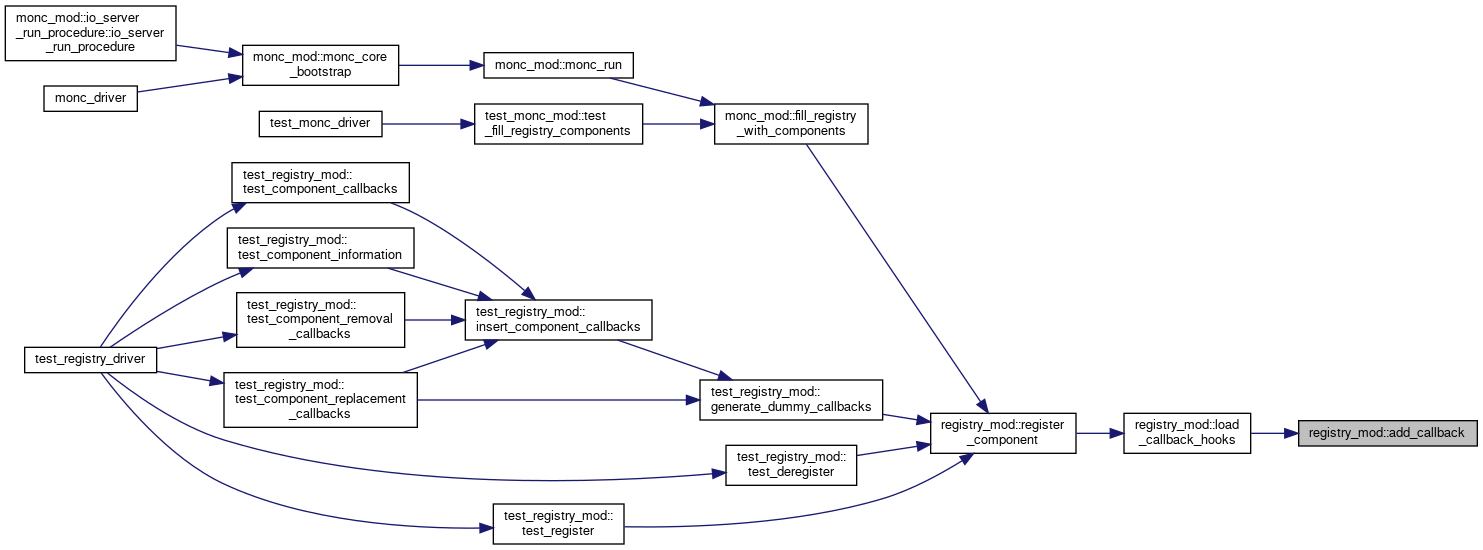
◆ deregister_component()
| subroutine, public registry_mod::deregister_component | ( | character(len=*), intent(in) | name | ) |
Will deregister a component, remove all callback hooks and free registry specific memory allocated to the component.
- Parameters
-
name The name of the component to de-register
Definition at line 225 of file registry.F90.

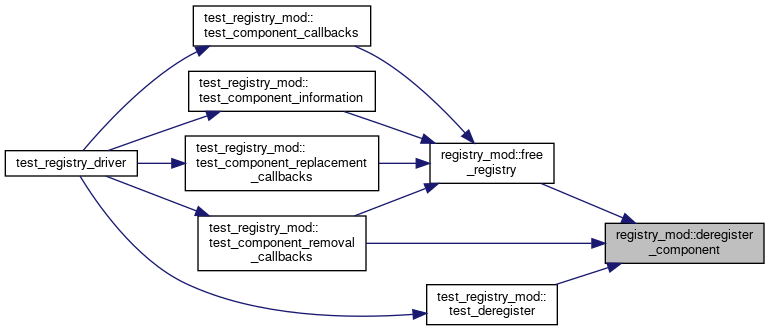
◆ display_callbacks_in_order()
|
private |
Displays the registered callbacks of a specific stage in the order that they will be called.
- Parameters
-
stageCallbacks The registered callbacks for a stage stagetitle The title of the stage - used for printing out information
Definition at line 435 of file registry.F90.

◆ display_callbacks_in_order_at_each_stage()
| subroutine, public registry_mod::display_callbacks_in_order_at_each_stage |
Displays the registered callbacks of each stage in the order that they will be called.
Definition at line 347 of file registry.F90.


◆ execute_callbacks()
|
private |
Will execute the appropriate callbacks in a specific map_type given the current state.
- Parameters
-
callbackmap_type The map_type of callback hooks to execute currentState The model state which may be (and likely is) modified in callbacks
Definition at line 625 of file registry.F90.

◆ execute_finalisation_callbacks()
| subroutine, public registry_mod::execute_finalisation_callbacks | ( | type(model_state_type), intent(inout) | current_state | ) |
Calls all finalisation callbacks with the specified state.
- Parameters
-
currentState The current model state which may (and often is) modified
Definition at line 293 of file registry.F90.


◆ execute_initialisation_callbacks()
| subroutine, public registry_mod::execute_initialisation_callbacks | ( | type(model_state_type), intent(inout) | current_state | ) |
Calls all initialisation callbacks with the specified state.
- Parameters
-
currentState The current model state which may (and often is) modified
Definition at line 274 of file registry.F90.


◆ execute_timestep_callbacks()
| subroutine, public registry_mod::execute_timestep_callbacks | ( | type(model_state_type), intent(inout) | current_state, |
| integer | group_id | ||
| ) |
Calls all timestep callbacks with the specified state.
- Parameters
-
currentState The current model state which may (and often is) modified
Definition at line 282 of file registry.F90.


◆ free_registry()
| subroutine, public registry_mod::free_registry |
Will deregister all components and free up the registry data structures. This can either be called at the end of execution to clean memory up or used to clear the registry.
Definition at line 76 of file registry.F90.

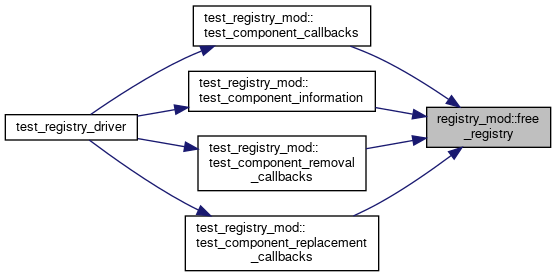
◆ get_all_component_published_fields()
| type(list_type) function, public registry_mod::get_all_component_published_fields |
Retrieves all of the published field information.
- Returns
- The list of published fields
Definition at line 184 of file registry.F90.
◆ get_all_registered_components()
| type(map_type) function, public registry_mod::get_all_registered_components |
Returns a brief summary of all registered components.
- Returns
- A map_type where the keys are the component names and value the corresponding version number
Definition at line 257 of file registry.F90.

◆ get_component_field_information()
| type(component_field_information_type) function, public registry_mod::get_component_field_information | ( | type(model_state_type), intent(inout), target | current_state, |
| character(len=*), intent(in) | name | ||
| ) |
Retrieves information about a components published field which includes its type and size.
- Parameters
-
name The name of the field to look up
- Returns
- The value wrapper that is associated with this field
Definition at line 164 of file registry.F90.

◆ get_component_field_value()
| type(component_field_value_type) function, public registry_mod::get_component_field_value | ( | type(model_state_type), intent(inout), target | current_state, |
| character(len=*), intent(in) | name | ||
| ) |
Retrieves the value wrapper of a components published field.
- Parameters
-
name The name of the field to look up
- Returns
- The value wrapper that is associated with this field
Definition at line 143 of file registry.F90.

◆ get_component_info()
| type(component_descriptor_type) function, pointer, public registry_mod::get_component_info | ( | character(len=*), intent(in) | name | ) |
Retrieves detailed information about a specific component.
- Parameters
-
name The name of the component to retrieve information for
- Returns
- The registry's copy of the component descriptor or null if it does not exist
Definition at line 240 of file registry.F90.

◆ get_group_descriptor_from_id()
|
private |
Given the id of a group this will return the corresponding descriptor.
- Parameters
-
group_id Id of the group to find
- Returns
- The descriptor that has the correct id number
Definition at line 411 of file registry.F90.

◆ get_group_descriptor_from_name()
|
private |
Given a group name this returns the group descriptor corresponding to that or an error if none is found.
- Parameters
-
group_name Name of the group to look up
- Returns
- Descriptor of the corresponding group
Definition at line 392 of file registry.F90.

◆ get_group_id()
|
private |
Given a group name this returns the id (i.e. order) of that group.
- Parameters
-
group_name The group name to look up
- Returns
- The id (also order) of the group
Definition at line 380 of file registry.F90.

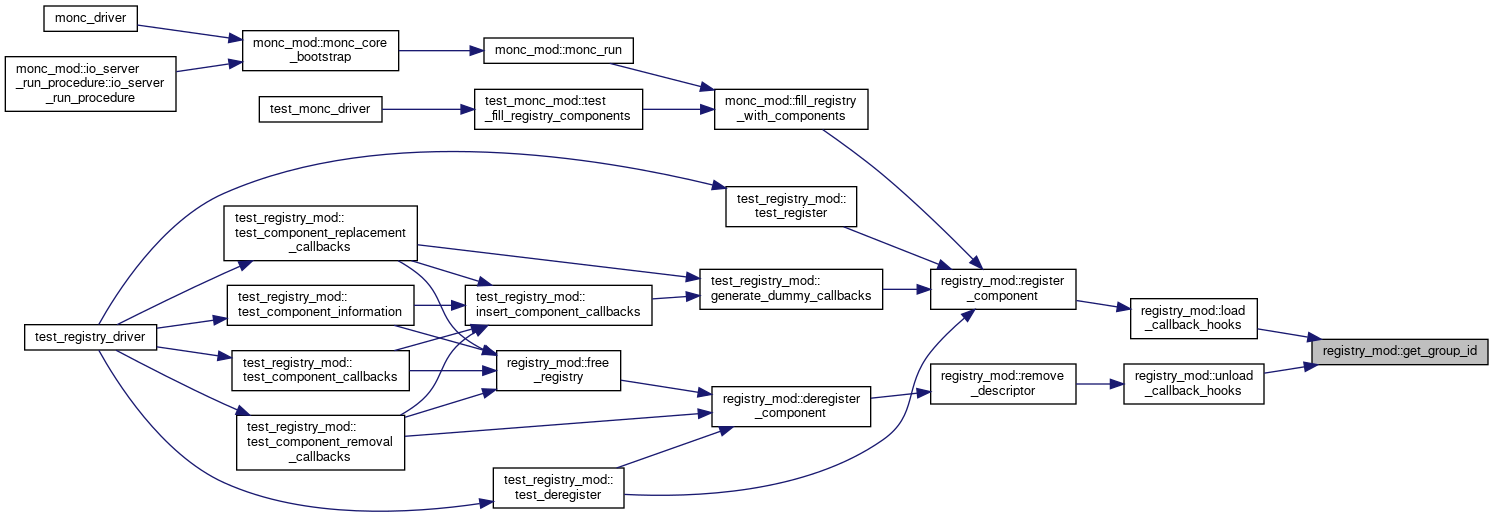
◆ get_highest_callback_priority()
|
private |
◆ get_ordered_groups()
| subroutine, public registry_mod::get_ordered_groups | ( | type(group_descriptor_type), dimension(:), allocatable | ordered_groups | ) |
Orders all the groups (in the order that they will be called in) and returns an array with these in order. This is useful for prefetching the groups in order so that per timestep we can just iterate through the array which is O(n)
- Returns
- An array of groups in the order that they will be executed in
Definition at line 362 of file registry.F90.


◆ init_registry()
| subroutine, public registry_mod::init_registry | ( | type(hashmap_type), intent(inout) | options_database | ) |
Initialises the registry with the provided configuration file.
- Parameters
-
configurationFileName The filename of the configuration file to parse
Definition at line 66 of file registry.F90.


◆ is_component_enabled()
| logical function, public registry_mod::is_component_enabled | ( | type(hashmap_type), intent(inout) | options_database, |
| character(len=*), intent(in) | component_name | ||
| ) |
Determines whether or not a specific component is registered and enabled.
- Parameters
-
component_name The name of the component to check for
Definition at line 333 of file registry.F90.

◆ is_component_field_available()
| logical function, public registry_mod::is_component_field_available | ( | character(len=*), intent(in) | name | ) |
Determines whether a specific published field is available or not.
- Parameters
-
name The name of the field to search for
- Returns
- Whether this field is found
Definition at line 134 of file registry.F90.
◆ load_callback_hooks()
|
private |
Will install the callback hooks for each state.
- Parameters
-
descriptor The component descriptor which is to be installed
Definition at line 555 of file registry.F90.

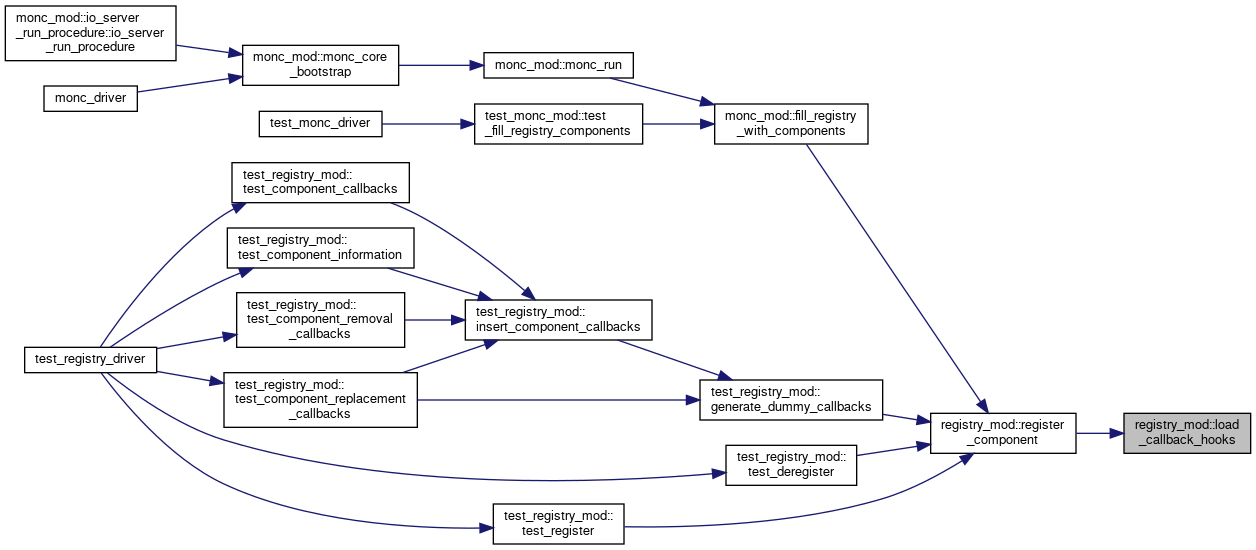
◆ load_published_fields()
|
private |
Loads the published fields information for an entire component into the registry's definition list.
- Parameters
-
descriptor The field descriptor to load in
Definition at line 192 of file registry.F90.

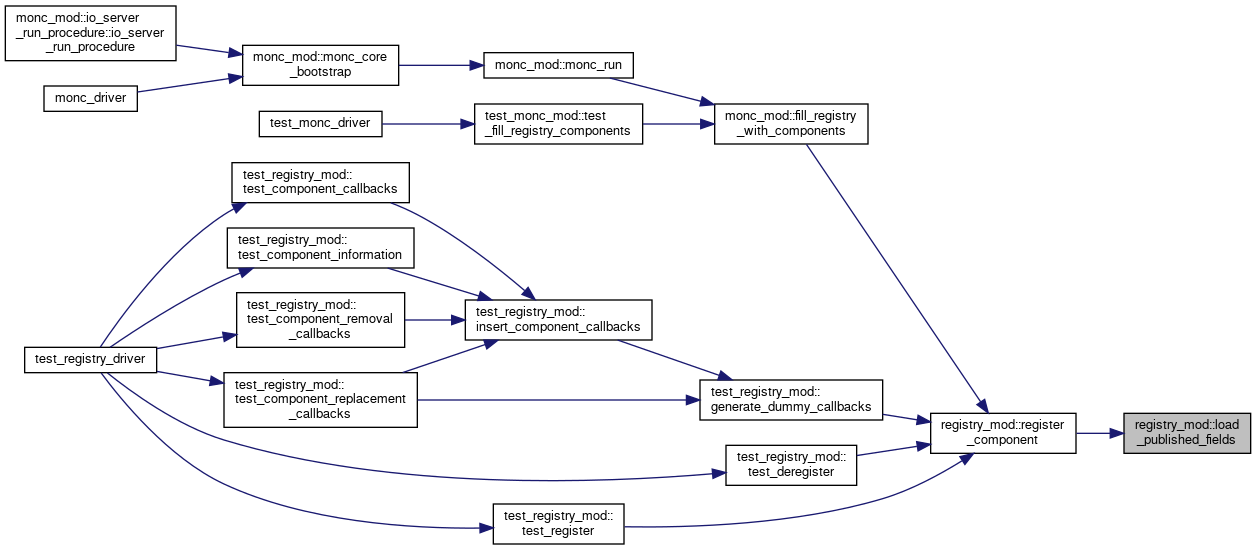
◆ order_all_callbacks()
| subroutine, public registry_mod::order_all_callbacks |
Orders all callbacks in the prospective stages based upon the priorities of each descriptor.
Note that this is an expensive operation as it involves multiple searches of the component list_types so should be called sparingly. When two priorities are equal then the order depends upon which one was registered first.
Definition at line 304 of file registry.F90.


◆ order_grouped_timstep_callbacks()
|
private |
Definition at line 317 of file registry.F90.


◆ read_group_configurations()
|
private |
Definition at line 469 of file registry.F90.

◆ read_initialisation_and_finalisation_orders()
|
private |
Definition at line 447 of file registry.F90.


◆ read_specific_orders()
|
private |
◆ rebalance_callbacks()
|
private |
Definition at line 571 of file registry.F90.


◆ register_component()
| subroutine, public registry_mod::register_component | ( | type(hashmap_type), intent(inout) | options_database, |
| type(component_descriptor_type), intent(in) | descriptor | ||
| ) |
Will register a component and install the nescesary callback hooks.
- Parameters
-
descriptor The component descriptor and a separate copy of this it stored as reference
Definition at line 99 of file registry.F90.

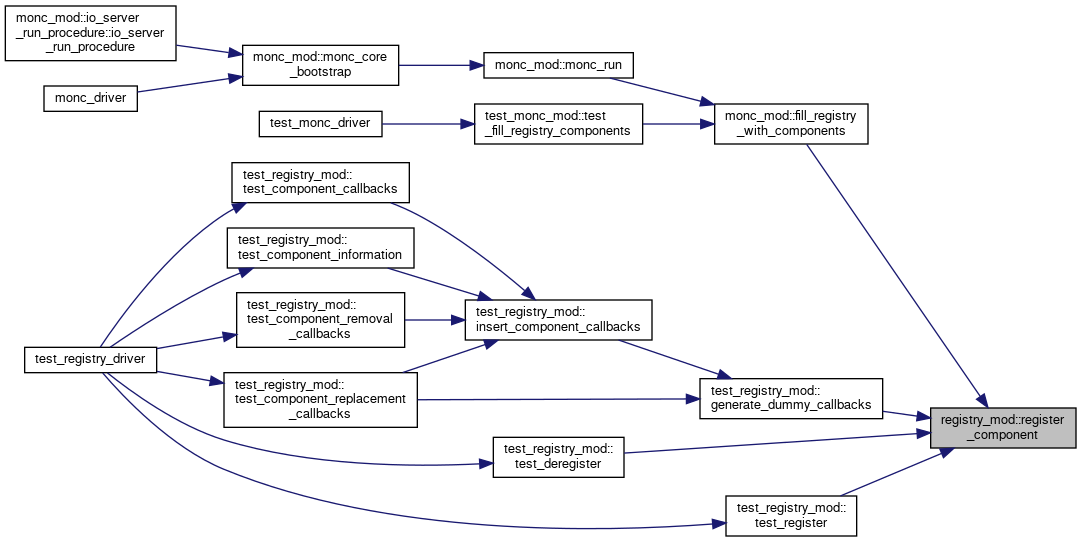
◆ remove_descriptor()
|
private |
Will remove a specific descriptor from the registry table and uninstall the corresponding callback hooks for each state.
- Parameters
-
descriptor The component descriptor which is to be removed
Definition at line 527 of file registry.F90.

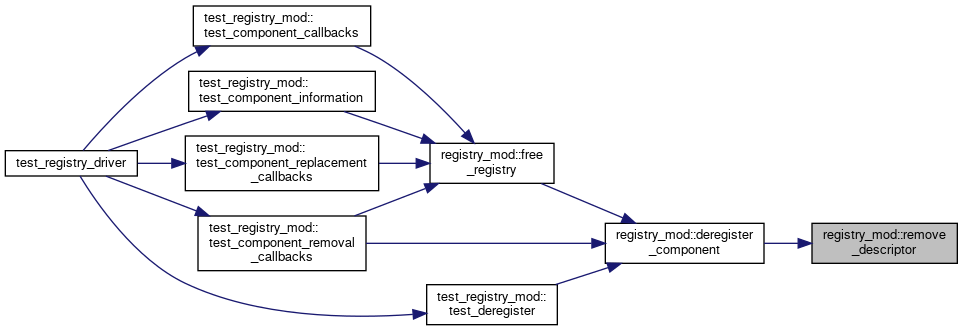
◆ unload_callback_hooks()
|
private |
Will unload the callback hooks that have been installed for each state.
- Parameters
-
descriptor The component descriptor which is to be unloaded
Definition at line 543 of file registry.F90.


Variable Documentation
◆ component_descriptions
|
private |
Copies of component descriptors.
Definition at line 47 of file registry.F90.
◆ component_groups
|
private |
Definition at line 47 of file registry.F90.
◆ enabled_component_input_keys
|
private |
Temporary read array of component enable names.
Definition at line 28 of file registry.F90.
◆ field_information
|
private |
Definition at line 25 of file registry.F90.
◆ field_procedure_retrievals
|
private |
Definition at line 52 of file registry.F90.
◆ field_procedure_sizings
|
private |
Definition at line 52 of file registry.F90.
◆ finalisation_callbacks
|
private |
Callback hooks for the finalisation stage.
Definition at line 47 of file registry.F90.
◆ finalisation_orderings
|
private |
Definition at line 47 of file registry.F90.
◆ group_descriptors
|
private |
Group descriptors for each group, name->descriptor.
Definition at line 47 of file registry.F90.
◆ group_locations
|
private |
Provides an id to each group.
Definition at line 28 of file registry.F90.
◆ group_type_column
| integer, parameter, public registry_mod::group_type_column =1 |
Execute the callbacks in this group for each column per timestep.
Definition at line 22 of file registry.F90.
◆ group_type_whole
| integer, parameter, public registry_mod::group_type_whole =0 |
Execute the callbacks in this group once per timestep.
Definition at line 22 of file registry.F90.
◆ group_types
|
private |
Group types.
Definition at line 27 of file registry.F90.
◆ init_callbacks
|
private |
◆ init_orderings
|
private |
Definition at line 47 of file registry.F90.
◆ timestep_callbacks
|
private |
Callback hooks for the timestep stage.
Definition at line 54 of file registry.F90.

